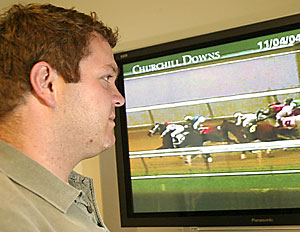 |
|
PHOTO COURTESY OF BECKY FARLEY
|
Sharon Kha, left, and Becky Farley, the UA physiology professor that encouraged her to enter the Tour de Tucson, take a break from a tandem cycle ride. Kha, a former UA spokeswoman, is taking on the challenge in an effort to curb the effects of Parkinson's disease, with which she was recently diagnosed.
|
|
|
By Natasha Bhuyan
Arizona Daily Wildcat
Friday, November 12, 2004
Print this
Sharon Kha rarely got on a bike before she had Parkinson's disease, so joining El Tour de Tucson a year after her diagnosis was an idea she called "preposterous."
But five weeks and 300 miles later, Kha, who left the university last month after 21 years as UA spokeswoman, is ready to participate in a 35-mile El Tour de Tucson ride to combat Parkinson's disease.
Kha was asked to join the race by Becky Farley, a physical therapist, neuroscientist and assistant professor of physiology, who was given $250,000 from the National Institutes of Health to research the impact of exercise on Parkinson's disease.
According to the National Institute of Neurological Disorders and Stroke, Parkinson's disease results from a degeneration of neurons in a region of the brain that controls movement, creating a shortage of the brain signaling a chemical called dopamine. The disease is characterized by slower movements, rigid limbs or a tremor in the hand.
But Farley, member of the Arizona chapter of the American Parkinson Disease Association and El Tour de Tucson winner in 1993, said she believes exercising helps slow the progression of Parkinson's because it releases chemicals called trophic factors, which protect the dopamine cells and keep them alive longer.
In clinical trials of people who have Parkinson's and exercise daily for at least 20 minutes, Farley said there is strong evidence indicating exercising is helpful for Parkinson's patients.
To educate Parkinson's patients, Farley developed "Power Over Parkinson's," a program that takes a holistic approach to Parkinson's, focusing on exercise and alternative medicine.
"If you can just keep the muscles moving in the early stages, no matter how often your brain says you can't do it, you can postpone or prevent the most debilitating effects of Parkinson's disease," Kha said.
At first, Kha said she was reluctant to join El Tour de Tucson, but said Farley's persistence and patience won her over.
The main event in El Tour de Tucson, the largest perimeter cycling event in the country with an expected 7,000 cyclists, is a 109-mile bike ride, but participants also have the options of the 81-mile, 66-mile, 35-mile, 4-mile, or quarter-mile rides.
Melanie Rineer, publicity director for Perimeter Bicycling Association of America Inc., said the purpose of El Tour de Tucson is to raise funds for local charities while encouraging people to stay fit and healthy.
The event, which has raised $2 million in 14 years, supports Tu Nidito Children & Family Services, a non-profit organization which provides individual, family and group support to children and their families dealing with terminal illnesses or death. This year, the Arizona Chapter of the American Parkinson Disease Association will also be added as a beneficiary, Rineer said.
Rineer said the theme of this year's El Tour Wellness Conference, held the Thursday and Friday before the race, is "Empowerment: Taking Control of One's Own Wellness." Parkinson's patients are the ideal example of the how exercise can be empowering, Rineer said.
Although Parkinson's disease eventually results in the loss of muscle, Kha said exercising and ignoring the signals in her brain that tell her she "can't take big steps, can't move fast, can't, can't, can't," has actually helped her develop new muscle.
"'Power Over Parkinson's' means fighting tooth and nail against what your brain is telling you," Kha said. "Taking Tai Chi for balance, getting massages to relieve the rigidity, working out at the gym, exploring acupuncture and doing exercise 20 to 30 minutes a day."
Kha said two other El Tour cyclists also have Parkinson's, and approximately 50 people will be wearing "Power Over Parkinson's" jerseys.
Richard B. Levine, professor of neurobiology and physiology and chair of the Physiological Sciences Interdisciplinary Graduate Program, said he will be riding in the 109-mile ride in support of Parkinson's awareness, as there are still numerous approaches that are being used to understand the disease and explore treatment.
Although Kha originally planned to ride on a two-person bike with Farley, Farley suffered an injury last week and will be unable to ride in El Tour. However, Farley said they will find a replacement partner for Kha, as nothing can stop her from cycling.
"It's an incredible experience," Kha said. "It's like being disease-free for a few hours."
